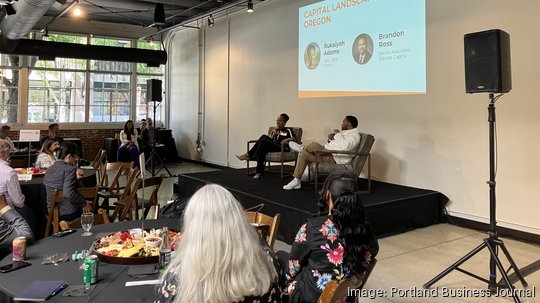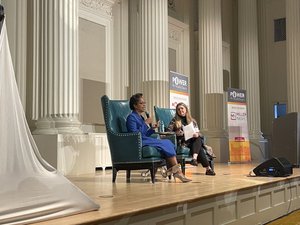
In the mid-2010s, Oregon emerged as a rising tech hub with startups jumping into the new mobile technology market and harnessing new cloud computing availability. Entrepreneurs moved in and started companies and big tech players opened outposts chasing that talent.
For the state to reignite that excitement, vibrance and growth there needs to be a plan to encourage in-migration and state deployment of capital, said Nitin Rai, founder of venture fund Elevate Capital.
Dozens of investors, entrepreneurs and economic development leaders met Thursday in Portland to discuss the future of innovation in the state and how Oregon can be part of it.
To attract tech innovators, it will take going back to the fundamentals of looking at macro technology trends and applying them to places that have not seen a digital transition, according to event speakers Monica Enand and Kanth Gopalpur. Both are successful Oregon entrepreneurs.
The event was organized by Elevate Capital and featured select portfolio companies as well as investors in the fund. The event was interactive and had tables of leaders brainstorming ideas based on themes like artificial intelligence, life sciences, sustainability and clean tech.
“We are here to co-create how we will make it happen,” emcee Allie Persitz, of the day's work. She is an Elevate investor and a former portfolio founder. Her company, software startup Hubb, received early investment from Elevate and she sold it in 2018.
Since the Covid-19 pandemic, Portland’s vibrant startup scene has become fragmented as new people moved to town at a time when events were on hold. The community, which had been event-driven, was isolated.
Rai has been one of many community leaders who have been trying to reignite some of the past excitement and connection. Other groups like UpStart Collective, Built Oregon, Oregon Entrepreneurs Network and TiE Oregon have been on similar missions. There is also an effort to create an innovation hub for the Portland metro. This hub, which is the result of the state's 10-Year Innovation Plan, is slated for downtown and is designed to help connect founders to resources.
But, at this event, the focus was idea generation.
Both Gopalpur and Enand told the sold-out crowd about how they launched their businesses at times of economic upheaval and transition: Gopalpur’s e-commerce business Monsoon Commerce in the wake of the dot-com bust, and Enand’s software-as-a-service business Zapproved during the 2008 economic crisis.
“We rode the SaaS wave. We took a manual thing and automated it,” said Enand, adding that this is the story of every SaaS company.
Applying this playbook to the macro trends around artificial intelligence and clean tech should be a key focus of the state’s investors and entrepreneurs, they said. As AI continues to explode, there will be real needs around things like energy consumption and supply chain to be addressed by entrepreneurs.
“We need to make sure Portland is an attractive place for startups,” said Gopalpur, and that means those in community today need to get involved in making that happen by participating in civic discussions.
A fireside chat with 1803 Fund CEO Rukaiyah Adams highlighted other areas of potential focus: natural resources and transportation.
“We need to think about water as an asset so the Californians and New Yorkers don’t monetize our water,” she said, adding that as we look at these resources and how to protect them and use them, we shouldn’t limit our ambition measuring Portland against peer American cities but should look globally for cues to places like Singapore or Taiwan.
How can we apply technology to manage snow melt and water and plan for climate change? she asked the crowd. Plus, she noted, our natural resources are not just for consumption, but there are wind and solar resources to be harnessed.
In the arena of transportation, she said she has gone all in on the potential for Cascadia High Speed Rail that would connect Vancouver, British Columbia with Portland.
“This could be a trillion-dollar jolt to the economy,” she said, which would offset the upfront capital investment. She added that Oregon needs a project like this much more than Washington or even California — states with military and federal research installations that ensure their transportation infrastructure is well working — so it will be incumbent on Oregonians to make rail happen.
For each of these areas of potential investment and economic growth there is potential for a flood of federal dollars, but the state must be ready for it.
“If the New Deal is coming (from the feds) we need to get in formation,” she said, adding that these are lessons learned from her work to land federal funding for to reconnect the lower Albina neighborhood.








